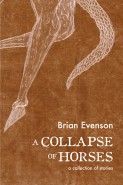
Book Review: A Collapse of Horses by Brian Evenson

A Collapse of Horses
Short Fiction by Brian Evenson
Coffee House Press, February 2016
ISBN-13: 978-1566894135
$16.95; 270 pp.
Reviewed by Karen Munro
In the title story of Brian Evenson’s collection A Collapse of Horses, the unnamed narrator is obsessed by his confusion about two seemingly unrelated things: the house in which he convalesces from a workplace accident, and a group of horses he’s seen lying down in a nearby paddock. Does the house have three bedrooms or four? Were the horses alive or dead? Unable to decide, he picks obsessively at these questions. In his mind, the horses “remain both alive and dead, which makes them not quite alive, nor quite dead.” And at the same time, he tells us, “I would awaken each day to find the house different from how it had been the day before.”
The implications of his uncertainty grow until the narrator’s world starts to collapse. How many children does he have? What kind of accident did he suffer? Is the woman who visits him really his wife? Did he really try to burn down the family home? Did his family really die in the fire? If not, why does he believe it? And what does it mean that “horse” and “house” are only one letter apart?
A Collapse of Horses is preoccupied with the uncanny, the unsettling, and the unknowable. Evenson is interested in philosophy and semiotics, the impossibility of ever truly knowing or naming the world, and our fundamental, helpless dependence on what our senses tell us. His characters flounder in essential confusion, grasping at straws of experience or perception that seem familiar, only to sink beneath them.
In “Seaside Town,” a man named Hovell and a woman named Miss Pickaver go on a European vacation. Miss Pickaver ventures out on her own, while Hovell stays behind in their rented French apartment, struggling to understand the language, the landscape, and the strange amorphous shapes he sees outside at night. By the time Miss Pickaver returns, Hovell is no longer really Hovell, although he greets Miss Pickaver with a sinister grin. The reader is left to decide exactly what Hovell saw outside, and what about his foreign experience has transformed him into a simulacrum of a man.
In “The Dust,” a story inspired by the 1981 sci-fi film Outland, the reader follows security guard Orvar around an off-planet mining operation that’s slowly filling up with dust and dead people. Is the dust sentient, an alien intelligence driving men to murder? Are the men being driven to murder by claustrophobia and oxygen deprivation? Or is Orvar the killer? It’s hard to say, even for Orvar himself, until we reach the end of the story and realize just how unreliable Orvar’s version has been all along.
The first and last stories in the collection, “Black Bark,” and “Blood Drip,” are a wonderful feat of the uncanny, reflecting each other in unnervingly familiar ways. In the first, a pair of exhausted outlaws plod up a mountain, fleeing unnamed pursuers. One of the men, Sugg, has been shot and is slowly bleeding to death. He disappears around a bend into thin air, leaving his partner Rawley alone in the wilderness. When Sugg eventually returns, he’s transformed into something that seems not quite human, or maybe not quite alive. He tells a strange, threatening story about a piece of black bark, a story that somehow spells out existential doom for the hapless Rawley.
The last story, “Blood Drip,” follows two different characters, Karsten and Nils, as they approach a walled town and are stoned by the inhabitants. Nils is knocked unconscious while Karsten flees to a safe distance. Like Sugg, Nils disappears when Karsten attempts to rescue him. Like Rawley, Karsten wanders confused and alone through a dark wilderness. When Nils reappears, he too seems inhuman and malevolent, poised to prey on his former friend. Like Sugg, Nils has a story to tell—the same story, it seems, since both Rawley and Karsten are powerless to resist hearing it. The reader, slowly recognizing “Blood Drip” for a fictional Doppelgänger of “Black Bark,” is in the same position as Rawley and Karsten.
What readers take for a stable, reliable scene in Evenson’s stories is almost always a set piece, a set-up for something else. What seems to be a story about a confused man, a man with a head injury or maybe a mental illness, becomes a story about how little we can trust our own perceptions. What seems to be a story about wounded outlaws becomes a reminder of how vulnerable we all are to story itself, how unable we are to resist its charms even if hearing it will change us irrevocably. Maybe the threats of Evenson’s stories are as unreal and ephemeral as the dreams and hallucinations in which they deal. But if things are uncertain in his characters’ minds, they’re doubly so in ours. “Horse” and “house” are only one letter apart, after all.
Karen Munro lives and writes in Portland, OR. Her work has appeared in Crazyhorse, Glimmer Train, Hunger Mountain, and elsewhere.

Leave a Reply